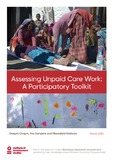Assessing Unpaid Care Work: A Participatory Toolkit
| dc.contributor.author | Chopra, Deepta | |
| dc.contributor.author | Sempere, Kas | |
| dc.contributor.author | Krishnan, Meenakshi | |
| dc.coverage.spatial | India | en |
| dc.coverage.spatial | Nepal | en |
| dc.coverage.spatial | Rwanda | en |
| dc.coverage.spatial | Tanzania | en |
| dc.date.accessioned | 2021-03-08T08:40:26Z | |
| dc.date.available | 2021-03-08T08:40:26Z | |
| dc.date.issued | 2021-03-07 | |
| dc.identifier.citation | Chopra, D.; Sempere, K. and Krishnan, M. (2021) Assessing Unpaid Care Work: A Participatory Toolkit, Brighton: Institute of Development Studies, DOI: 10.19088/IDS.2021.016 | en |
| dc.identifier.isbn | 978-1-78118-753-1 | |
| dc.identifier.uri | https://opendocs.ids.ac.uk/opendocs/handle/20.500.12413/16439 | |
| dc.description.abstract | This is a participatory toolkit for understanding unpaid care work and its distribution within local communities and families. Together, these tools provide a way of ascertaining and capturing research participants’ understanding of women’s unpaid care work – giving special attention to the lived experiences of carrying out unpaid care work and receiving care. Please note that these tools were developed and used in a pre-Covid-19 era and that they are designed to be implemented through face-to-face interactions rather than online means. We developed the first iteration of these tools in our ‘Balancing Care Work and Paid Work’ project as part of the Growth of Economic Opportunities for Women (GrOW) programme. The mixed-methods project sought to collect data across four countries – India, Nepal, Tanzania, and Rwanda – with data collected in four sites in each country (16 sites in total). The participatory tools were developed with two main intentions: (1) as a data collection tool to gain a broader understanding of the social norms and perspectives of the wider community in each of the 16 sites; and (2) to be implemented with our local partners as a sensitisation tool for the community regarding women’s unpaid care work burdens. While it is not essential to apply these tools in the order that they are presented, or even all of them, we would suggest that this toolkit be used in its entirety, to gather in-depth knowledge of social norms around the distribution of unpaid care, and the impacts that these have on care providers’ lives and livelihoods. | en |
| dc.description.sponsorship | International Development Research Centre | en |
| dc.language.iso | en | en |
| dc.publisher | Institute of Development Studies | en |
| dc.rights | This is an Open Access toolkit distributed under the terms of the Creative Commons Attribution Non Commercial 4.0 International licence (CC BY‑NC), which permits use, distribution and reproduction in any medium, provided the original authors and source are credited, any modifications or adaptations are indicated, and the work is not used for commercial purposes. | en |
| dc.rights.uri | http://creativecommons.org/licenses/by-nc/4.0/ | en |
| dc.subject | Gender | en |
| dc.subject | Participation | en |
| dc.subject | Work and Labour | en |
| dc.title | Assessing Unpaid Care Work: A Participatory Toolkit | en |
| dc.type | Other | en |
| dc.rights.holder | Institute of Development Studies | en |
| dc.identifier.team | Gender and Sexuality | en |
| dc.identifier.doi | 10.19088/IDS.2021.016 | |
| rioxxterms.funder | Default funder | en |
| rioxxterms.identifier.project | Default project | en |
| rioxxterms.version | VoR | en |
| rioxxterms.versionofrecord | 10.19088/IDS.2021.016 | en |
| rioxxterms.funder.project | 9ce4e4dc-26e9-4d78-96e9-15e4dcac0642 | en |
Files in this item
This item appears in the following Collection(s)
-
IDS Research [1671]
Except where otherwise noted, this item's license is described as This is an Open Access toolkit distributed under the terms of the Creative Commons Attribution Non Commercial 4.0 International licence (CC BY‑NC), which permits use, distribution and reproduction in any medium, provided the original authors and source are credited, any modifications or adaptations are indicated, and the work is not used for commercial purposes.


